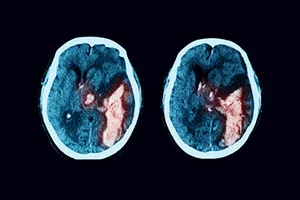Brain Injury Attorneys in Illinois

Injuries to the brain, despite being invisible, can be some of the most catastrophic injuries a person can endure. Most of us take our brain function for granted, until we suffer a serious head injury or traumatic brain injury (TBI), and realize just how much is in jeopardy. Unfortunately, for the most part, brain cells cannot be replaced, especially if a large quantity of them are damaged or destroyed, which can happen with a traumatic brain injury. The result is that the effects of a brain injury—cognitive, emotional, behavioral, and physical-- can be permanent and life altering. That is why it is so important to get the best medical care and to find a knowledgeable brain injury attorney to protect your rights if you or a loved one have suffered a traumatic brain injury.
Head trauma cases can be medically complex and legally challenging. Your attorney must be experienced with these kinds of cases and have access to doctors and experts who are up to date with the current science if you want to win your brain injury case. The compassionate brain injury attorneys at The Collins Law Firm understand the scientific and legal aspects involved, as well as the emotional impact that these kinds of injuries can have on the family. We encourage families and patients to seek emotional support--which is often necessary when they are dealing with the consequences of these injuries--while we guide them through the legal process and fight to secure the maximum compensation for their brain injury.
How Dangerous are Traumatic Brain Injuries?
What are the Major Causes of Brain Injuries?
What are the Different Types of Brain Injuries?
What are the Symptoms of a Traumatic Brain Injury?
what-are-the-long-term-effects-of-Traumatic Brain Injury?
What are the Financial Costs of a Brain Injury?
Concussions, and the dangers they pose, are getting attention because of the studies on football players suffering from a debilitating brain disease called chronic traumatic encephalopathy (CTE) as a result of sustaining multiple concussions while playing professional football. But it is not just football players that need to worry about brain injuries.
The Centers for Disease Control reports that 2.53 million people sustained traumatic brain injuries in 2014 (the most recent statistics available). More worrisome is the fact that about 288,000 of these people (including 23,000 children) required hospitalization, and 56,800 of them (including 2529 children) died from their injuries. This statistic makes it clear that brain injuries are a serious problem in the U.S. The leading causes of traumatic brain injuries include car accidents, serious falls, blows to the head (including sports injuries) and assaults. Additionally, many more people sustain non-traumatic brain injuries due to a stroke or lack of oxygen to the brain. Overall, an estimated 5.3 million people in the United States are living with a permanent TBI related disability. As you can see, the consequences of traumatic brain injuries can be very serious.

Motor vehicle accidents – A driver or passenger in a car or motorcycle can suffer a traumatic brain injury if their head slams into the car during a crash or they are thrown from a car or motorcycle on impact. Truck and auto accidents account for the majority of TBIs in people 15 - 44 years old and result in about one fifth of TBI related hospitalizations.
Serious falls – Another leading causes of traumatic brain injuries—falls--are responsible for almost half of TBI related emergency room visits. These can involve something as serious as falling down stairs or even something as simple as falling on ice or in a nursing home. These injuries occur most frequently in children and older adults over 65, and are the leading cause of TBI-related hospitalizations for the young and the elderly.
Birth injuries – These injuries are sustained by newborns as a result of medical negligence during childbirth, and can result in permanent brain damage with devastating, lifelong consequences. Improper force used on an infant’s head or lack of oxygen to the baby’s brain can result in permanent disability.
Bicycle accidents – Bike accidents are a significant source of traumatic brain injuries, especially when children are thrown over the handlebars. The danger is greatest among children who ride their bikes without a helmet.

Medical malpractice – Brain injuries and brain damage due to medical negligence usually involve a lack of oxygen to the brain. This can occur as a result of the improper administration of anesthesia, surgical errors, failing to diagnose a heart attack or stroke, medication errors, or failing to treat a brain infection.
Sports and recreation – Many athletes, young and old, suffer traumatic brain injury as a result of playing sports. Concussions are most likely in football, but basketball, soccer and even cheerleading account for a large number of concussions each year. It’s important to note that the damage multiplies with more than one concussion.
Trauma to the head – Traumatic brain injuries can occur during an assault, when a victim suffers a violent blow or strikes their head on an object after being knocked down. Other situations that can result in a TBI include child abuse, domestic violence, and shaken baby syndrome. Some of the most serious brain injuries occur when a victim suffers a gunshot wound to the head.

There are many types of brain injuries from mild to severe. Below are a few classifications of brain injuries:

Additional Symptoms of a Moderate to Severe Brain Injury
If you are experiencing any of these symptoms, it is critical that you see a doctor immediately for an evaluation and treatment.
In addition to the symptoms that show up within the first few weeks after an injury, traumatic brain injuries can also have long lasting and sometimes permanent effects. Some of these can impair a person’s ability to work, participate in regular daily activities or live independently. Others may damage personal relationships. In any case, the costs of these injuries can be huge.
Long-term effects can include:

Life after a traumatic brain injury can be challenging, and can put tremendous mental and emotional burdens on a patient and his or her family. The financial burden of a traumatic brain injury can be just as significant. According to Chandi Edmonds, a professor at Northwestern University’s Feinberg School of Medicine, the unemployment rate for adults with brain injury two years after diagnosis is 60 percent, while the lifetime cost of a patient’s treatment for a traumatic brain injury can total in the millions. The costs of TBIs are so high because they can include significant medical expenses, long term therapy, lost income, and possibly even lifetime care. These two factors together—lost income and huge expenses—can be financially devastating for most families. That is why it is critical to seek out an experienced brain injury attorney to fight for compensation and recovery of expenses.
Get the Legal Help You Need When You are Suffering
If you or a family member has suffered a traumatic brain injury because of someone else’s negligence, please take it seriously. Seek medical help as soon as possible for a diagnosis and treatment plan. Be mindful that an emergency room cannot accurately diagnose a brain injury, so a visit with a physician who has experience with brain injuries is essential. After you have seen a doctor and been diagnosed, call our experienced brain injury attorneys at (630) 527-1595 for a free evaluation of your case. If we determine you have a legal claim, we will fight to get you the maximum compensation for your injuries, so you can focus on your recovery.
For more information, read our Brain Injury Blog.
"*" indicates required fields











I had an excellent experience being represented by Collins Law Firm. Ed Manzke and Amber Blevins were amazing to work with and truly helped me in my time of need. Both were extremely personable and knowledgeable throughout every step of the way. I would absolutely recommend them for anyone’s legal needs.